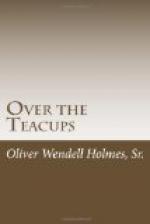At 11 P. M., Bird-warbling Interlude by Miss Mabel Stephenson, U. S. A.
At 11.20, Second Concert.
Notice!
Three Great Pictures.
Lord Tennyson. G. F. Watts, R. A.
John Stuart Mill G. F. Watts, R. A.
Joseph Garibaldi Sig. Rondi.
Notice!
A Famous Violin.
A world-famed Stradivarius Violin, for which Mr. Hill, of Bond Street, gave L 1000, etc., etc.
Refreshments.
Tickets for Tea, Coffee, Sandwiches, Iced Drinks, or Ices, Sixpence each, etc., etc.
I hope my American reader is pleased and interested by this glimpse of the way in which they do these things in London.
There is something very pleasant about all this, but what specially strikes me is a curious flavor of city provincialism. There are little centres in the heart of great cities, just as there are small fresh-water ponds in great islands with the salt sea roaring all round them, and bays and creeks penetrating them as briny as the ocean itself. Irving has given a charming picture of such a quasi-provincial centre in one of his papers in the Sketch-Book,—the one with the title “Little Britain.” London is a nation of itself, and contains provinces, districts, foreign communities, villages, parishes,—innumerable lesser centres, with their own distinguishing characteristics, habits, pursuit, languages, social laws, as much isolated from each other as if “mountains interposed” made the separation between them. One of these lesser centres is that over which my friend Mr. Haweis presides as spiritual director. Chelsea has been made famous as the home of many authors and artists,—above all, as the residence of Carlyle during the greater part of his life. Its population, like that of most respectable suburbs, must belong mainly to the kind of citizens which resembles in many ways the better class,—as we sometimes dare to call it,—of one of our thriving New England towns. How many John Gilpins there must be in this population,—citizens of “famous London town,” but living with the simplicity of the inhabitants of our inland villages! In the mighty metropolis where the wealth of the world displays itself they practise their snug economies, enjoy their simple pleasures, and look upon ice-cream as a luxury, just as if they were living on the banks of the Connecticut or the Housatonic, in regions where the summer locusts of the great cities have not yet settled on the verdure of the native inhabitants. It is delightful to realize the fact that while the West End of London is flaunting its splendors and the East End in struggling with its miseries, these great middle-class communities are living as comfortable, unpretending lives as if they were in one of our thriving townships in the huckleberry-districts. Human beings are wonderfully alike when they are placed in similar conditions.




